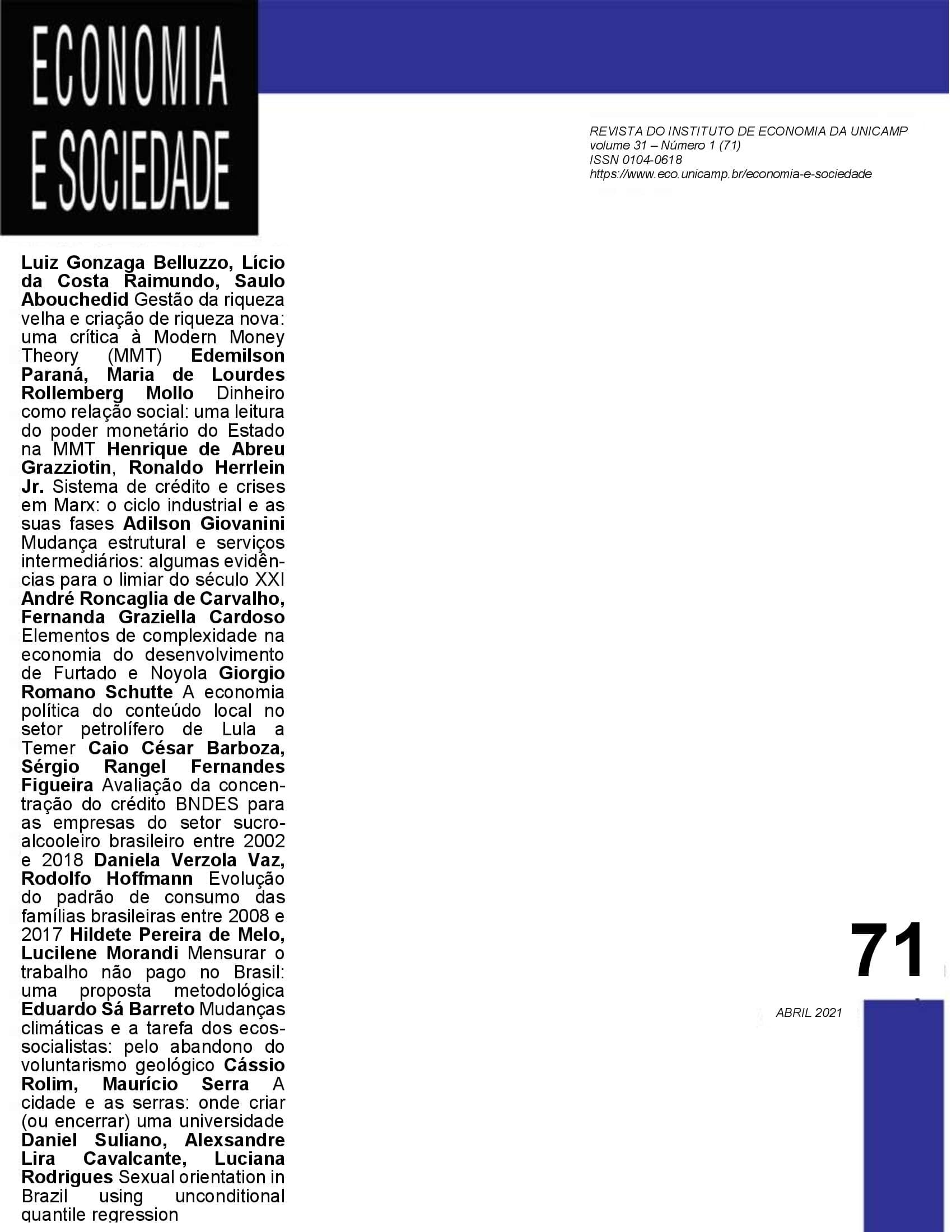Abstract
The debate on monetary policy, currency and its nature has returned to the center of the economic debate in Brazil and in the world. At the heart of the proposed debate are central issues, such as, the impossibility of a sovereign government to not honor debts denominated in its own currency, the central proposition of Modern Monetary Theory (MMT), in addition to putting into doubt what were, until recently, basic assumptions of conventional economic theory, such as the indispensability of a monetary regime supported by an Independent Central Bank, that pursues inflation targets. In this context, this article has two main objectives. First, it seeks to identify more precisely the theoretical frameworks that support two different views on what currency is in a fully developed capitalist economy. On the one hand, the view of the commodity currency, which incorporates the theoretical construction of classical political economy; on the other, currency seen as a social institution, belonging to the Keynesian-Marxist theoretical framework. Second, it seeks to understand the main assumptions of MMT and its points of convergence and divergence in relation to the two views mentioned above. From the Keynesian-Marxist perspective, it is concluded that the theoretical approaches that treat states and markets as abstract entities, operating in ideal scenarios, far from the real economic, social and political conditions of the present moment, such as MMT, are not supported.
References
AGLIETTA, M.; ORLEÁN, A. A violência da moeda. São Paulo: Brasiliense, 1982. Introdução à segunda edição.
BELL, S. Can taxes and bonds finance government spending? Reserve accounting and government finance. In: The Third Annual Post-Graduate Economics Conference: Conference Papers, Leeds University Business School, 1998.
BELLUZZO, L. G. O capital e suas metamorfoses. São Paulo: Editora Unesp, 2013.
BELLUZZO, L. G.; GALÍPOLO, G. A escassez na abundância capitalista. São Paulo: Editora Contracorrente, 2019.
BLANCHARD, O.; SUMMERS, L. Revolution or evolution? Rethinking macroeconomic policy after the great recession. Cambridge, Massachusetts: MIT Press, 2019.
CONTI, B. M. D. Políticas cambial e monetária: os dilemas enfrentados por países emissores de moedas periféricas. Tese (Doutorado)–Instituto de Economia, Unicamp, 2011.
HENWOOD. A teoria monetária moderna não está ajudando. Jacobin Brasil, 25 jun. 2019. Disponível em: https://jacobin.com.br/2019/06/a-teoria-monetaria-moderna-nao-esta-ajudando/?fbclid=IwAR1fgfB1dfrZnZUfPNzROZ7vGQcvKN51uTVICjERWMvLv1MAUhFYBO5_rMs. Acesso em: 25 nov. 2019. LARA RESENDE, A. Juros, moeda e ortodoxia: teorias monetárias e controvérsias políticas. São Paulo: Editora Portfolio, 2017. KALECKI, M. Os aspectos políticos do pleno emprego. In: KALECKI, M. Crescimento e ciclo das economias capitalistas: ensaios selecionados e traduzidos por Jorge Miglioli. São Paulo: Hucitec, 1977. KEYNES, J. M. (1930). The treatise on money. Cambridge: Cambridge University Press, 2013. v. I e II. KEYNES, J. M. (1936). A teoria geral do emprego, do juros e da renda. São Paulo: Editora Abril Cultural, 1983. KNAPP, G. F. (1905). The state theory of money. New York: Augustus M. Kelley, 1973.
MARX, K. (1894). O capital: crítica da economia política. São Paulo: Nova Cultural, 1988. (Os Economistas). Livro terceiro. 1983.
MAUSS, M. Essai sur le don. Forme et raison de l'échange dans les sociétés archaïques. Paris: PUF, 2007.
MUNDELL, R. A. Capital mobility and stabilization policy under fixed and flexible exchange rates. The Canadian Journal of Economics and Political Science, v. 29, n. 4, p. 475-485, 1963.
PRATES, D. M. Crises financeiras dos países “emergentes”: uma interpretação heterodoxa. Tese (Doutorado)–Instituto de Economia, Unicamp, 2002.
PRATES, D. M. Monetary sovereignty, currency hierarchy and policy space: a post-Keynesian approach. Campinas: Unicamp. IE, set. 2017. (Texto para Discussão, n. 315). RUML, B. Taxes for revenue are obsolete. American Affairs, v. 8, n. 1, p. 35-39, 1946.
VERGANHINI, R.; DE CONTI, B. Modern Monetary Theory: a criticism from the periphery. Brazilian Keynesian Review, v. 3, n. 2, p. 16-31, 2018.
WRAY, R. Modern Monetary Theory. A primer on macroeconomics for sovereing monetary systems. 2. ed. New York: Palgrave Macmillian, 2015.

This work is licensed under a Creative Commons Attribution 4.0 International License.
Copyright (c) 2021 Economia e Sociedade


